The Tale of a Student Hustle: The Candy Man

What really makes someone an Entrepreneur? Is it starting a company? Creating and executing ideas? Taking business risks and reaching success or failure..and having to start over? These are just a few generalizations around the idea of Entrepreneurship. I have seen the hustle and I have felt the hustle.
Brett McKay, creator of the art of manliness defines hustling as:
“Doing whatever you have to do, for however long as you have to do it, until you reach your goal.”
Entrepreneurs hustle. Education is tied into Entrepreneurship in the idea that we can learn some core skills or other general knowledge enabling us to better understand the world and participate in it. Whether or not entrepreneurship can be taught is another topic on its own.
Education is one of the greatest liberating forces, but not everyone can get the same dose of liberation. No one chooses the situations they are born into, we can only make due and adapt. I was not born into a wealthy family, I was raised by a single mother and lived at borderline poverty levels, and this was often masked.
My mother always use to say, “Just because we're poor, doesn't mean we have to look poor.”
She was always big on appearances and perception. One thing she did observe and even I had a basic understanding of at the age of 15, was the poor state of the public education system. My younger brother and I always enrolled in private schools because the risk of going to public schools in my area was too much of a gamble for my mother.
My mother never went to college and worked as a nurse's aid in a nursing home. I have watched my mom struggle and it would rightfully bring about anger in a young child's heart. However, I was not angered because from a very young age I had a global perspective and saw my situation as but one of many separate families and individuals fighting a battle. This was the results of the harsh realities of the world and I was not sheltered from it, I could only continue to fight on and take action. I did not have time to be paralyzed by my emotions and excuses were not an option. As a young child in a fragile household, you are called upon to grow up very quickly and take on a lot of responsibilities. I was always described as wise beyond my age when I was younger, but it was just survival.

by MSM
When the time came to choose a high school, my mother and I selected a private institution, Mount St. Michael Academy in Bronx, NY. My mother sent me to these private institutions on faith, having little money, limited family help or other resources, but there was one thing she did have and that was belief in my potential and capabilities; each time we found a way to get through it.
As it turns out, I am now writing this as a recent graduate of Fordham University, and a much stronger and wiser person who can clearly elaborate on all that went on between the years 2006 - 2009, in which candy helped me to hustle and hack my way through high school.
One day, as I am taking the subway home from school, something happens. A young male walks onto the train, with a shirt drenched in sweat as if he had been working in the sun all day and with him, a school bag and multiple boxes of candy in hand.
He announces his intent to make a better living for himself, in order to stay off the streets by selling candy, as he continues to persuade the disinterested subway passengers to purchase his goods. I thought to myself, “Should I sell candy on the train?” Fear quickly set in, as did the realization that selling candy on the train would take tremendous time away from school when the goal is to be able to stay in school. Nonetheless, the thought was planted.
Sophomore Year, the birth of the candy man
Making it through freshman year of high school was filled with uncertainty. My mother was burdened with a number of bills and I was at risk of being suspended from school because of unpaid tuition. Under no circumstance did I want to be a statistic; a young black male, fatherless, high school dropout resorting to a life of drugs and crime with a child, while he himself still a child. Things did not escalate that quickly, my mother was able to get her tax refund check in time and forfeited a majority of it to cover my tuition costs. She could not continue doing that because there were other past due bills that she had depended on the refund check to pay off and the school would be stricter going forward on tuition collection.
It was in my sophomore year that I observed something truly great. Another student had been selling candy secretly to fellow classmates. This student, who will be referred to as Mr. K, would eventually become my rival.
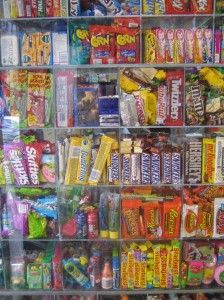
example of a local grocery deli shop
The dominant feeling at this point was both fear and hope. I had a lot of reasons to be afraid, but I could not let excuses cause this opportunity to get away. I learned how to understand my own fears and I decided I would sell candy in school.
I used some of the remaining cash my mom had given me and went to my local grocery store and bought $20 worth of candy, which were 50 cents each at the time, to the look of a confused store clerk. With a gym string bag full of 40 pieces of candy, I was able to sell them all off to hungry students excited for a moving “vending machine”. Within a few weeks I had grown exponentially and this gave birth to the candy man. I observed the fundamental needs of the students and began to hack my way through school earning funds to help my mother.
The term “hack”, is used not solely in the misinterpreted evil computer hacker sense, but in the way that I broke down how the system and people worked and used the knowledge to circumvent it and extract value.
Paul Graham, programmer and co-founder of Y Combinator seed capital firm, defines the alternate use of the word hack in term "hack" as,
“When you do something so clever that you somehow beat the system”.
To pull off this successfully, I had to understand the limitations and other challenges. Understanding the broad spectrum of limitations was a competitive advantage that saved a lot of time and allowed me to better focus my efforts. These are the major limitations to overcome:
- I have some tough competition: Mr. K was my main competitor and he was the most successful at the time, but there were two other competitors that were selling candy as well. It would be difficult to remove the incumbent candy sellers in order to obtain the market shares necessary to make worthwhile profits.
- Selling Candy or any outside material is not allowed: I noticed on numerous occasion other competitors operating recklessly and getting their merchandise confiscated. This posed a problem for me because of the extra attention from teachers towards what was going on in their classrooms and in the halls.
- The clock is ticking on past due tuition: At this point I would not be able to generate enough revenues to be able to pay the tuition, this was in my mother's view her responsibility, all I could do was try to generate enough profits to help ease the burden financially, to make day to day things much more manageable.
- I have a limited amount of space to carry goods: There were pressures to bring as much candy as I could possibly sell to generate more profits. Also, I did not want to sell out too early and risk normal customers going to some of my other competitors. On the other hand, I did not want to overstock and have left overs, especially the chocolate candy which would melt if left over in a warm bag.
- I was limited towards small time windows to actually do sales: I had specific times I would sell in order to keep suspicions low and the operation organized. It was crucial to map out the key times of the day to take advantage of.
- I risked having goods or money stolen: As the time came where I was making decent money, under a teenager's standards, I posed the risk of attracting the wrong crowd who may be tempted to take what I had earned. In addition, I had to find my way out of possible blackmailing.
- My candy operations should not interfere with my education: It was important that my candy operations did not negatively affect my school performance. If it did, I would have to stop selling candy. Time management, communication and execution are crucial to make this work.
- I needed to make enough money to make it worthwhile selling: There was only so far I could go with selling candy alone. In that early stage using information was vital to extracting as much value as possible. I also did not own a computer until around junior year of high school so all metrics were still pen and paper.
Mr. K
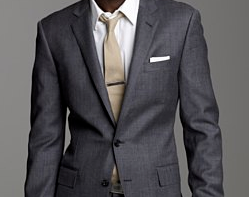
photo from Men's Wear House, the salesman nature of Mr. K
My rival, Mr. K, sold a similar assortment of candy. During my early operational stages, by the end of sophomore year, Mr. K was still more popular with the students. Here is a description of Mr. K with some of my early perceptions on him. He was a little shorter than me with a larger build. He was friends with a number of the “cool kids” and he was also quite good at basketball. Mr. K was also a good student, who often took a lot of upper level courses. He did however, fit the foreign “merchant trader” profile in some of his appearances. Mr. K also had a certain charisma about him when selling things and I had a feeling he would either work in sales or work in finance over at Wall St. one day. I did not know his motivations, but I still to this day respect his smarts, business knowledge and entrepreneurial spirit.
Mr. K did have an early advantage over me regarding the candy business, he sold canned drinks. I witnessed the rush of students who went to Mr. K first to get drinks, and then some would maybe come to me afterwards. Soon he built a strong following and students would go to him for all their snack and drink needs.
Mr. K's popularity soon worked against him though, teachers became suspicious of his actions and on multiple occasions, his candy would be confiscated. Each time, he went right back to business when things quieted down.
It was then that I also realized the importance of needing at least one competitor. If I were to outgrow my rival Mr. K in popularity, I would need the capacity to support all the new customers. I had to keep in mind that doing so could potentially bring unwarranted attention that could jeopardize my operation. I had to scale my operations responsibly.
Understanding the field and refining my craft
I did not have family, friends or books to learn from or talk to get the business knowledge and the strategy I had acquired. What it all came down to was trusting my instincts, clearing the noise, listening and observing to the fundamental needs of my fellow students or of the customers in this case. I acquired a focus that enabled me to prioritize and execute, as well as the ability to control my emotions because emotions were the most important piece to my success, not necessarily logic. This is because I was dealing with people –– teenagers to be exact –– whose emotions were ever changing. I needed to understand people to a much higher degree and leadership was the starting point.
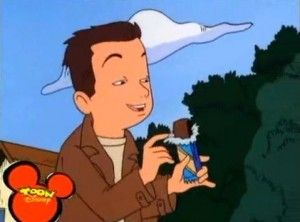
Francis "The Hustler Kid" from Recess
I used an index card as my candy menu for transactions in classes that I had cleared as “OK” to sell in. This was determined by observing the personalities and behaviors of the teachers. Observing the teachers reactions to seeing candy being eaten in class was a huge indicator of whether or not I would be able to sell. I also established rules of operations with my fellow students. These rules included when and where to purchase, maintaining classroom cleanliness and other rules regarding interactions with me. I sold assorted candies such as: M&M's, Skittles, Snickers, Reese's pieces, Starburst, Kit Kats and a number of other favorites.
My high school has three buildings, the main building with four floors, the freshman building with five floors, which divided up the large freshman class and the senior building with two floors. Most of my transactions were done in the main building because it was the common destination of a significant portion of the student schedules. My core customers were usually from my own class level, with a smaller portion of customers being upper or lower classes.
The key selling periods were the start of the day when students began to arrive for class, homeroom, which was near the start of the day when attendance was taken and announcements were given. During this time students were allowed to eat in class under the permission of the "cool" teachers, so it was a key opportunity not only to supply my class but students of the surrounding classes usually on the same floor. Lunch time was also a key selling time for obvious reasons and due to the fact that I was cheaper than the vending machines. Transitional periods between the end and start of classes were also short windows to sell and I had to learn how to be as efficient as possible.
Understanding the marketplace dynamics and competition is important, but the customers are your lifeline.
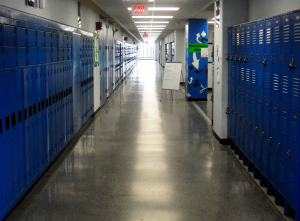
similar hallway setting
I needed to understand the different characteristics of my customers based on where they were situated. The different territories and conflict areas between competitions included: homeroom, shared classes, shared floors, identical schedules as well as selection of merchandise.
My main rival, Mr. K, purchased a majority of candy from Costco, which was a wise decision as he was able to get large quantities at discounted rates. However, he often limited his product line for candies based on the candy Costco would offer which was usually the generic kind. I made the decision to maintain a good relationship with my local grocery store and they were able to import or acquire a lot of unique candies which gave me a competitive advantage. They even threw in some informal discounts here and there. I sacrificed profits for the short-term, but acquired long-term advantage because of my unique candy line that couldn't be easily replicated by my competitors.
There wasn't always good days, sometimes I had a good portion of left over candy, and leftover chocolate was bad as it would melt. I started loaning candy out on credit based on available supply. I gained information on the discretionary income of my customers based on purchasing frequency, quantity and how often they would take out candy loans.
Junior & Senior Year: the years of growth and expansion
Near the end of my sophomore year, I was growing steadily and continued to help my mom with the tuition and bills, but it was not enough. I looked for ways to possibly expand beyond candy and bring in additional lines of revenue. I noticed there was a segment of students that just would not buy candy or a portion who just became tired of it. I needed an alternative that would help to differentiate me from my competition, something that would not take up too much space and also still had good margins.
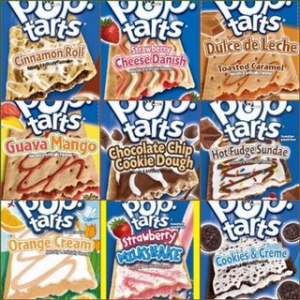
multiple varieties of Pop-Tarts
This alternative was Pop-Tarts.
Pop-Tarts were easy to carry, cheap, varied in flavors and it was a good alternative to candy, being that it is a pastry.
In order to keep the margins high, I mapped out the local supermarkets in my area acquiring information on their sales calendar, which would save me tremendously over time. I would preferably only purchase large sums of Pop - Tarts during these sales periods. Imagine a kid, clearing the pop-tart shelves as if like a store employee removing bad products filling their carts, only to see that kid take that cart full of Pop-Tarts to the cashier. The Pop-Tarts were a hit with students and brought in some other key demographics that I didn't have before. Some bestsellers were frosted strawberry, frosted cookies & cream and frosted hot fudge sundae.
The turning point
My junior year I was able to get into a number of honors classes. This had a number of benefits: I had a modified schedule that allowed me to get access to more honors students but I still was able to have some core classes and reach the main student body to sell. In addition, my lunch schedule was one of the largest in student population and my Pop-Tarts were a big hit as a lunch alternative to expensive school food.
The honors teachers were less suspicious of their students selling candy and also allowed them to eat in class, which allowed me to operate much more freely. The biggest win came from the administrative office. Due to my financial needs and much improved grades I was able to acquire a partial scholarship which greatly eased the burden on my mother and me. I could now turn the focus into investing more in my operations.
I ran my operations smoothly through sophomore and junior year of high school without getting goods confiscated or stolen. How did I pull this off? Understanding of the concerns of my customers and respecting people in general.
There was a lot of mini-crisis management and I followed the motto, the customer is always right for a majority of my run. I never flaunted my money or bought flashy clothing. I maintained my humbleness throughout my whole time selling candy and other goods.
Although I refer to them as customers, they are foremost my fellow students and I showed each and every one of them respect, regardless if they deserved it or not. I served them and it was a privilege they bestowed to me by allowing me to operate in secrecy with a mutual understanding that I was doing it for the right reasons. A number of the smaller competitors in the candy business quit and for the most part it was me and my rival Mr. K. At this point I had surpassed Mr. K in sales and built strong loyalty among the students.
I looked to expand further. Mr. K as I had mentioned earlier had sold canned drinks. This posed a lot of limitations because of the weight and size while maintaining stealth. I did want to expand into drinks. I pondered for a few days and decided on the perfect alternative, Capri Sun.
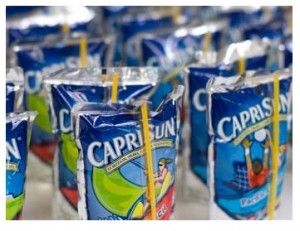
a bundle of Capri Sun
These drinks could be packed together in my book bag as the book requirements lessened in junior year going forward and I sold them for 50 cents each. I usually promoted them as two for $1 and often times sold them in combination with either candy or Pop-Tarts.
During lunch time or gym, there would be a flood of students waiting to get their hands on some. Eventually, I began to carry two string bags on my way to school, one of which contained just drinks, which I would store in my locker. I also stored extra boxes of pop tarts in my locker as demand grew.
I had accidentally stumbled upon a way to increase the sales of my Capri Suns significantly, without changing the product too much. One day, as I was stocking up late, the box of Capri Suns I had picked up was way too warm, so I placed it in the freezer early in the a.m.and I took them out before I left for school without thinking much.
That day as I sold them, one student happened to be pleasantly surprised and proceeded to buy two more. I was confused at first and thought it was the flavor. When I inquired more, what actually happened was that the Capri Sun didn't completely freeze, but turned to slushy. The word spread of my slushy Capri Suns and I sold out by homeroom. I would be prepared the next few days and weeks ahead with a refreshing Capri Sun that students could get if they purchased early. The product line of candy, Pop- Tarts and Capri Sun strengthened my lunch-time stronghold. The school lunch was expensive for a number of students and my operations was a much-needed alternative and enabled them to afford a cheaper lunch by purchasing 2 Capri suns and a pop tart for just $2 for example and it was filling for some.
A sip of victory

cafeteria similar to half of the dimensions of my old High School. Not our actual caf.
I had reached a point where my operations and products were fully streamlined and I began to average out around $15 - 20 an hour selling candy, Pop-Tarts and Capri Sun.
I had a new problem now. I had too much free cash sitting around.
Data was taken all throughout my time selling and I had key mental notes of the personalities, demographics and most importantly credit worthiness, from a buildup of mental notes I took on product loans. This was the perfect opportunity to setup an informal loan shark side gig.
I took calculated risks on loans that I would offer towards students that needed it. A majority of loans were in small amounts ranging from $1, the most frequent, to $10.
My interest rate was a one-time flat rate on the amount loaned, at 25%. This is of course very high, but for high school students they didn't mind, and if they were borrowing a dollar in their head a 25 cent cost was not much to them. In fact this helped my fellow students more than me as they had access to line of credit that of course a bank would not service and their parents may not had at the time to give them. I also informally gave no-interest loans to a number of students which I had believed to be of significant disadvantage, as I personally could understand what they were going through and I wanted to help them when they were down and not take advantage of their situation.
My rival, Mr. K, stopped selling by senior year and I had continued selling into my senior year but significantly scaled down my operations halfway through to better enjoy my final moments in high school. Earlier I had begun to purchase generic candy as Costco to cut down on costs and inflation began to spin out of control as this was nearing the time of the 2008 economic crisis. With present day inflation, it would be very difficult to recreate what I did those 3 years, without buying and selling in larger volumes from a discounter.
My final inventory
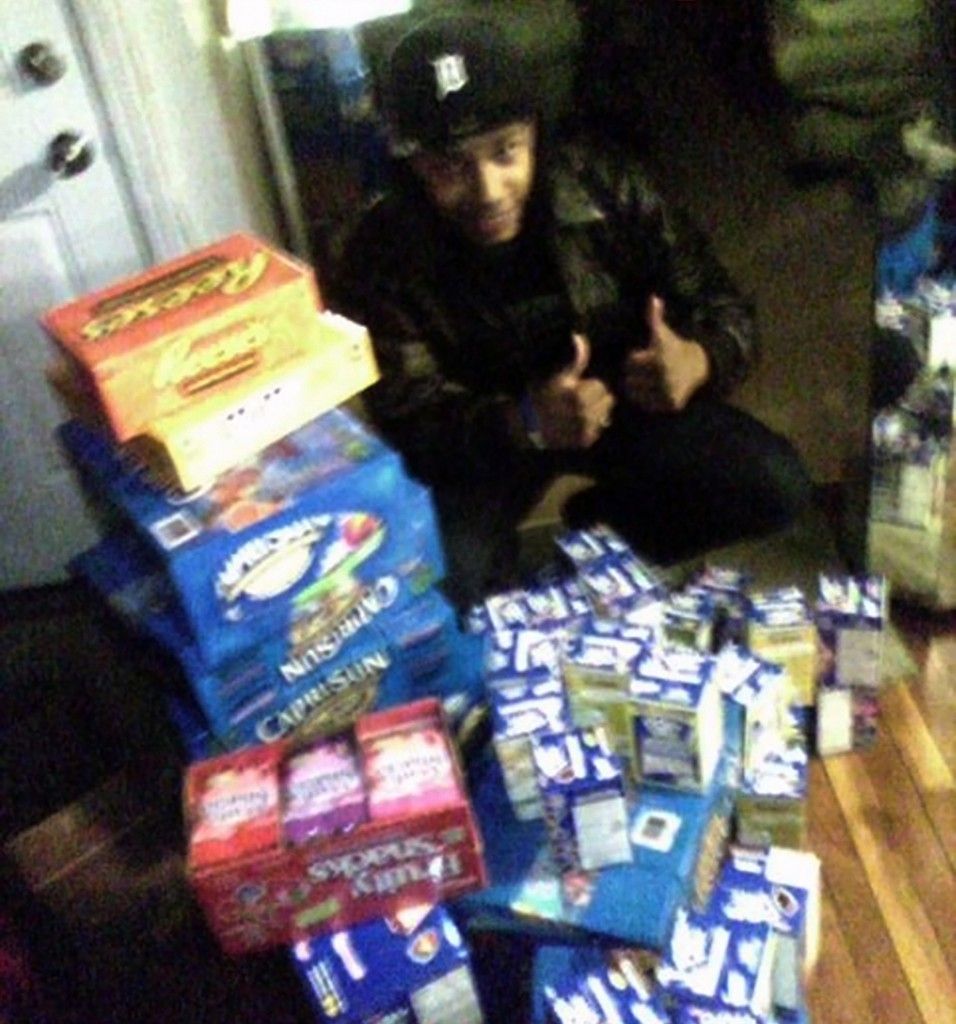
photo taken with potato
All in all, this was quite a life changing experience. It was survival and taking advantage of opportunities to the fullest. I've learned so much about myself and about respect for others. I refused to be a victim of society and took matters into my own hands. The entrepreneurial spirit wasn't an occupation for me it was relationship building, knowing my value proposition and giving people what they wanted.
Takeaways and other conclusions
Never doubt yourself. The day you do is the start of your decline. This isn't to be confused with unrealistic expectations. Confidence is crucial because it is the first step in overcoming your fears. There will be many challenges in life, but understand that you are not alone. Do not sacrifice the respect of others for comfort because it will be a very short term comfort. You have to develop yourself and maintain your respect for others so that you can help others and they can then help you in return. However, don't assume you will always get something in return. My personal motto is that I can work hard every single day and not get anything in return and this does not mean I should stop working hard. Understand that there is not a special formula for success, there are many different factors including hard work, luck and skill to name a few. Working hard puts you in the position to find and be prepared to harvest opportunities and when you respect others and work hard people take notice and you build a reputation for yourself. Selling candy was hard work for me, but other people are sometimes forced to make much more difficult choices in their lives to make ends meet. To those of you I say keep at it, continue to find as many opportunities as you can.
Everything isn't always black and white. Never lose the hunger you are feeling now. That hunger will protect you in the future. Complacency is a very dangerous thing, it makes you vulnerable to change. In today's economic downturn, expect a lot of change and be equipped to adapt to it. But be patient, and don't mistake patience for inaction. Become a keen observer not only of your surroundings, but the world. Acquire a global perspective, the grand view of things that will allow you to learn from history and notice the different cycles that go on allowing you to take advantage of opportunities. The global perspective also allows you to see the inter-connectivity between people. All the conflict that is going on is like a cancer cells attacking the body. We are all cells to the same body that should share knowledge and resources and live on for a common goal.
The Present
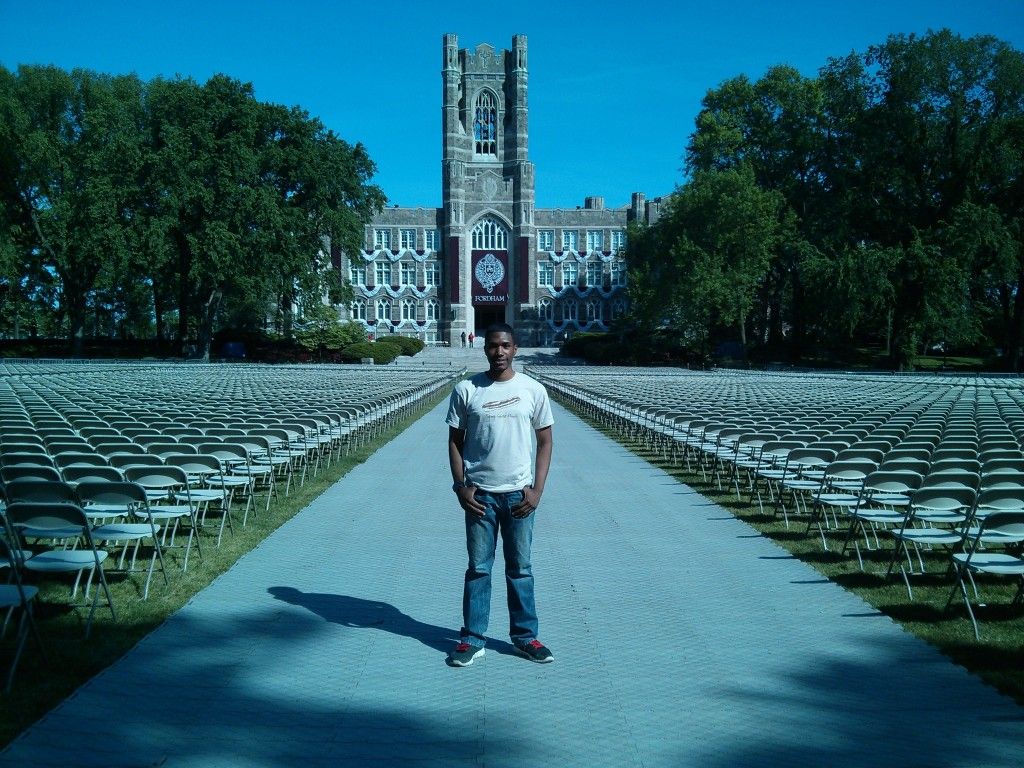
I went on to attend and graduate from Fordham University. The next area of opportunity I went on to find was technology. I didn't grow up in a household to get an early start with technology, so I discovered the necessary resources online to teach myself a number of skills and learn very quickly.
I went on to win a number of leadership awards at Fordham and one quote that described a multiplier really stock out to me.
“A multiplier is someone who uses his or her intelligence to amplify and bring out the smarts and capability of those around them.”
I find strength through helping others and if I can't help them, I drive myself to learn as much as I can and become wiser so I can be better prepared to help them. Having a growth mindset and a vast curiosity has helped me to achieve the knowledge necessary without putting unnecessary restrictions on myself. I also, try to become keener at finding opportunities, so I can share them with others.
I worked as an application developer intern for Standard & Poor's and AOL during my junior and senior year of college. Both of these internships were paid and made all the difference for a huge increase in living standards. Under no circumstances could I have done an unpaid internship.
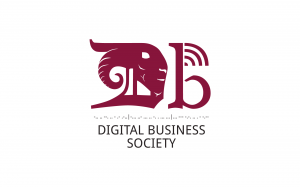
In school, I took the initiative and founded a business and technology club at Fordham called the Digital Business Society, which bridges the gap between technical and non-technical students to collaborate. There are a lot of opportunities in the next frontier, the Digital Economy.
I hope my story has helped you in some way. I am always open to conversation so feel free to contact me or share this story with someone. Stay optimistic, with optimism there is progress.
"Be kind, for everyone you meet is fighting a hard battle."